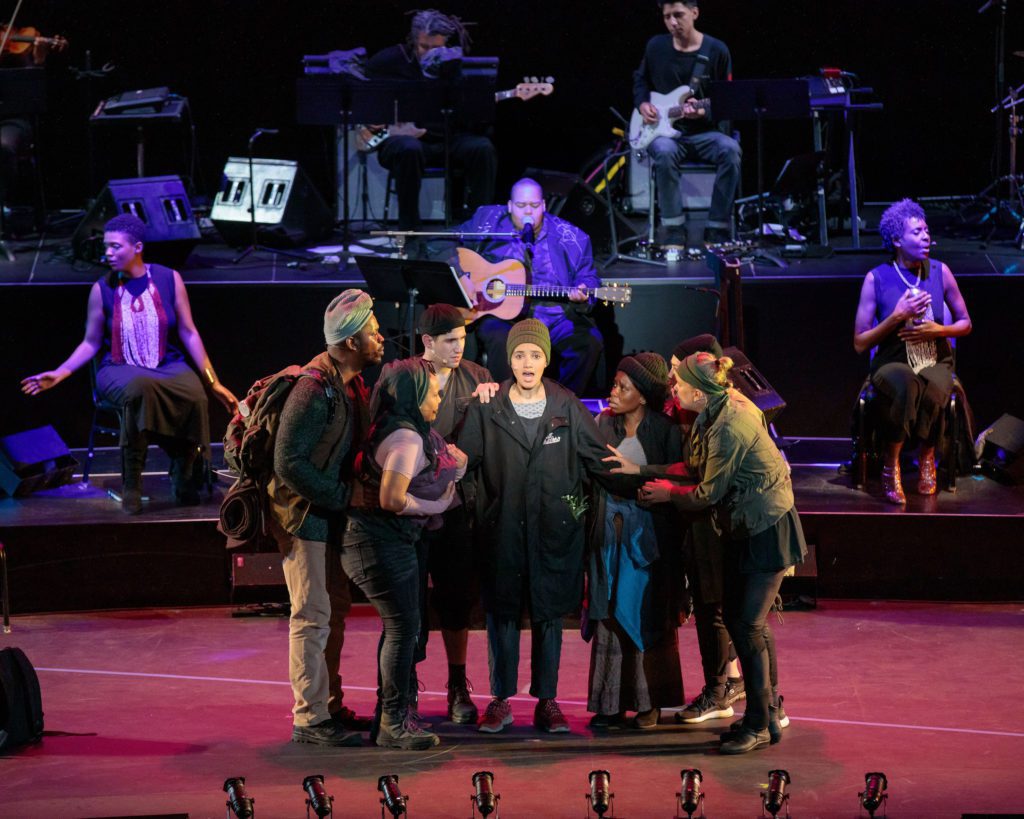Afrofuturist Opera at Strathmore, April 28-29
By • March 9, 2022 0 985

Shortly after Donald Trump’s 2017 inauguration, two dystopian classics, George Orwell’s “1984” and Margaret Atwood’s “The Handmaid’s Tale” — the first published in 1949 and the second in 1985 — belatedly surged onto best-seller lists. The Hulu series based on “The Handmaid’s Tale” premiered that spring, making the red cloaks and white bonnets a frequent sight at protests, the Coney Island Mermaid Parade and Halloween.
Dystopian fiction, a politicized subgenre of science fiction dating to H. G. Wells’s “The Time Machine,” if not to Jonathan Swift’s “Gulliver’s Travels,” had caught fire. The common thread? Societies overwhelmed by pollution, disease, crime, repression, war and (often) dehumanizing technology. In “1984,” we find ourselves in Oceania; in “The Handmaid’s Tale,” in the Republic of Gilead.
African American author Octavia E. Butler’s “Parable of the Sower,” published in 1993, is set in Robledo, not the Sonoma winery but a struggling, racially diverse neighborhood in Greater Los Angeles, walled off from its lawless surroundings in the post-apocalyptic United States of the 2020s. (Relax: the novel’s time period doesn’t start until 2024.)
Postponed twice due to the pandemic — which has made it even more timely — a musical adaptation of “Parable of the Sower” by Toshi Reagon and Bernice Johnson Reagon, directed by Eric Ting, will be presented at Strathmore on Thursday, April 28, and Friday, April 29. The two D.C.-area performances (the show is touring mostly college venues this spring) are being co-presented by Woolly Mammoth Theatre Company.
Promotional materials call the production a “fully-staged opera [that] brings together over 30 original anthems drawn from 200 years of Black music to recreate Butler’s sci-fi, Afrofuturist masterpiece live on stage.” Led by composer, guitarist and vocalist Toshi Reagon, 58, the 15 performers in the cast sing individually, in small groups and as a chorus in styles ranging from gospel to blues to folk to rock. “I just try to be true to what I’m sonically hearing in my head. I’ve never adhered to genres,” said Reagon in a 2021 Afropop Worldwide interview, following her selection as one of the recipients of a $75,000 Herb Alpert Award in the Arts.
Named after the wife of her godfather, legendary folk singer and activist Pete Seeger, Toshi Reagon was raised in Washington, D.C., in the midst of civil rights protesting and music-making; her parents were half of the original four members of the Freedom Singers, a group that toured under the auspices of the Student Nonviolent Coordinating Committee.
Toshi’s mother, “Parable of the Sower” creative partner Bernice Johnson Reagon, 79, founded the all-woman, African American a cappella group Sweet Honey in the Rock in 1973. After completing a Ph.D. at Howard University, Dr. Reagon taught at American University and worked as a Smithsonian folklorist, continuing to sing with Sweet Honey until 2004.
Both were fans of Octavia Butler, who died in 2006, aged 58. Born in Pasadena, California, Butler convinced her mother to buy her a typewriter when she was 10, then got to work. As a Pasadena City College freshman, she won a short-story contest, began to write novels and, mentored by Harlan Ellison, went on to win Hugo and Nebula Awards (the latter for “Parable of the Talents,” the 1998 sequel to “Parable of the Sower”). In 1995, Butler was the first science fiction writer to receive a MacArthur “Genius” Fellowship.
The two “Parable” novels were meant to be followed by others, which Butler did not complete, in what is known as the Earthseed series. Protagonist Lauren Olamina, who we meet in “Parable of the Sower” at age 15, is the hyper-empathetic daughter of a Baptist minister, the strict, experience-scarred leader of his family and of the Robledo community.
After a string of horrific events that destroys both, she becomes a northbound refugee, fighting to survive and seeking to make spiritual sense of humanity’s bleak condition. She calls the religion that begins to form in her mind and in her writings Earthseed.
Based on the Earthseed series, among other works, Butler is considered a pioneer of Afrofuturism, defined by curator Ingrid LaFleur as “a way of imagining possible futures through a Black cultural lens.”
The Reagons acquired the rights to “Parable of the Sower” in 2014. As they developed the opera, inspired by Butler’s vision and by their own shared past, they chose a frame that enables the ensemble cast to interact freely and invites the audience to become part of the narrative’s embattled, evolving community. Surely, theatergoers deprived of in-person performances for much of the past two years will be receptive to this approach, while finding the dystopian scenario all too relevant.
As Toshi Reagon said in last year’s Afropop interview: “Her [Butler’s] clock in the book is so accurate, it’s scary.” Offering some hope, Butler herself once remarked: “These novels are not prophetic. These novels are cautionary tales.”
Octavia E. Butler’s “Parable of the Sower” plays at the Music Center at Strathmore April 28-29 at 8:00 p.m.

